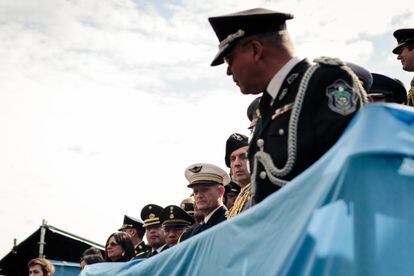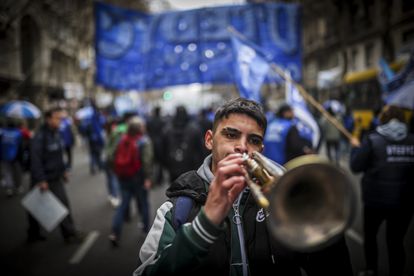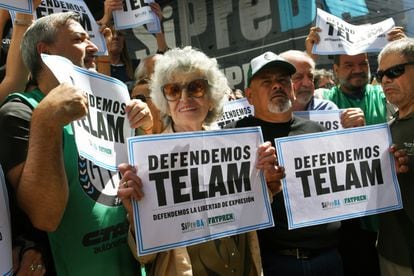You are using an out of date browser. It may not display this or other websites correctly.
You should upgrade or use an alternative browser.
You should upgrade or use an alternative browser.
Argentina Elects Far-Right Libertarian Javier Milei To Presidency
- Thread starter FAH1223
- Start date
More options
Who Replied?
Javier Milei sweeps away 22 army generals in largest military shake-up in 20 years
For analysts, the government is handing ‘a clear message of empowerment’ to the military, which now also occupies important positions in the Defense Ministry
Javier Milei sweeps away 22 army generals in largest military shake-up in 20 years
For analysts, the government is handing ‘a clear message of empowerment’ to the military, which now also occupies important positions in the Defense Ministry

Members of the Argentine Armed Forces during a military parade in Buenos Aires, in a file photo.NURPHOTO (VIA GETTY IMAGES)
CONSTANZA LAMBERTUCCI
Buenos Aires - JAN 03, 2024 - 11:58 CET
Argentine president Javier Milei has shaken up the command structure of the country’s Armed Forces. The ultra right-wing politician assigned the Air Force to head the Joint Chiefs of Staff, the highest executive body of the military. In addition, he introduced changes in the leadership of the Argentine Army, Navy, and Air Force. The most drastic modifications were made within the army, where Milei appointed Alberto Presti as Chief of the General Staff and automatically retired 22 generals. For analysts, Milei’s government is handing “a clear message of empowerment” to the military, which now also occupies important positions in the Ministry of Defense.
The appointments announced Monday in the Official Gazette indicate that Brigadier-General Xavier Julián Isaac will be the new head of the Joint Chiefs of Staff; Rear Admiral Carlos María Allievi will take command of the Air Force; Brigadier-Major Fernando Luis Mengo, the Navy, and Brigadier-General Presti, the Army. With this last appointment, 22 senior generals will automatically retire: 23 if the resignation of the former Chief of the Joint Chiefs of Staff, Juan Martín Paleo, is added. That represents two thirds of the command corps, according to an estimate made by Clarín newspaper. It is the most drastic change in the army since the government of Néstor Kirchner (2003-2007), when the Peronist president forced 19 generals to retire.
Commanders who had links with the previous government, led by Peronist Alberto Fernández, have thus been removed from the army’s leadership structure. Fabián Calle, a political scientist specializing in defense issues, warns that the decision “has no ideological or political significance,” as he believes it did in Kirchner’s 2003 purge. “When one looks at the names, it is a homogeneous generalship; none of them is considered either left or right wing,” says Calle, who believes Presti was installed as army chief because he is a “young” military man with a “good image” within the forces. The political scientist believes the decision responds to a “profound renewal of the army” based on Milei’s defense and security agenda. “It is an important weapon in the government’s strategy for border control,” he adds.
Alignment with the United States
Analysts are waiting to see how the appointment of Isaac to head the Joint Chiefs of Staff from the air force will translate after a decade of army leadership of that command. “I venture that there will be a more linear view of subordination to the United States,” says Luciano Anzelini, a PhD in social sciences and professor at the Torcuato Di Tella University. This hypothesis is in line with the intentions of Milei, who during the electoral campaign stated that his government would align itself with Washington, Israel, and “the nations that respect freedom.” “We have to see how the Armed Forces are reconstituted from a strategic point of view,” says Anzelini, who was an official at the Ministry of Defense between 2019 and 2022 under the administration of Fernández.The Joint Chiefs of Staff was consolidated as the highest military leadership body after the 1982 Falklands War between Argentina and the United Kingdom. At that time, it was considered the failure of the war was brought about by a lack of joint action between the three branches of the military and the Joint Chiefs became more relevant in terms of advising the Minister of Defense. Since Argentina’s return to democracy in 1983, the air force has been the head of the Joint Chiefs of Staff across three periods — between 1985 and 1989, in 1992, and between 2003 and 2013 — a total of almost 15 years. The army has held the position longest overall, some 21 years in total since the end of the last dictatorship, while the navy has only led the Joint Chiefs for around four years.
Historical claims
Members of the Armed Forces voted en masse for Milei in the elections of November 2023, when the ultra-right-winger, leader of La Libertad Avanza, obtained 56% of the ballot against the Peronist Economy Minister Sergio Massa. The new government will have to respond to some of the historical claims of the military, which for years has been demanding that their salaries be on a par with those of the security forces and that they be assigned a larger budget. During the Fernández administration (2018-2023), the National Defense Fund was created and a process of salary parity with the security forces was initiated, which is still ongoing. Within the Armed Forces, they expect these measures to have continuity under Milei.During the electoral campaign Milei’s running mate, Victoria Villarruel, led the way on defense and security issues. The daughter, niece, and granddaughter of military men, she promised to increase the budget of the Armed Forces while Milei anticipated cuts in areas such as science, health, and education. In addition, Villarruel denied state terrorism during the last dictatorship in a speech that did not meet with the expected applause from the barracks, staffed today by new generations of military men. After the triumph of La Libertad Avanza, however, Villarruel was left by the wayside. The portfolios of Security and Defense went to Patricia Bullrich and Luis Petri, respectively, whose joint candidacy for the presidency was defeated in the first round of the elections; both subsequently threw their support behind Milei.
Calle points out that the salary and budgetary improvements that may be promoted from the Defense Ministry, however, will be conditioned by the Ministry of Economy, which will have to control inflation that is advancing at 1% per day, according to the government. “The military needs a stable economy, like any ordinary citizen,” says Calle. The political scientist adds that “there is also a lot to be done at a symbolic level. Monday’s appointments added to others in the Ministry of Defense, where retired military officers occupy important positions, such as the vice-minister, Claudio Ernesto Pasqualini. “They have never had such a presence in the Ministry of Defense since the return to democracy,” notes Calle.
The institution saw its funding reduced after the return to democracy and ceased to be a relevant actor in Argentine politics with the fall of the military dictatorship (1976-1983), which caused more than 30,000 people to disappear according to the estimates of human rights organizations. The Armed Forces had previously controlled Argentine politics for more than 50 years. In 1930, with the first coup d’état, they began a long series of attempts to repress the first mass political party in Latin America, the Radical Civic Union (UCR), and then, from 1955, Peronism. By the time they handed over power in 1983, they had forcibly removed five democratic governments from power. For many years, the military has been attempting to improve its public image.
Redirect Notice
www.google.com
This sounds insane. Balancing a budget is a simple math problem, but a hard political problem. Problem.
Imagine if they slashed the budgets by 50% of every federal agency.
It looks great at the beginning til you need to bring back the people you fired because the government can't function and the economy begins to sufferRedirect Notice
www.google.com
This sounds insane. Balancing a budget is a simple math problem, but a hard political problem. Problem.
Imagine if they slashed the budgets by 50% of every federal agency.
Like what happened with Twitter? Lol.It looks great at the beginning til you need to bring back the people you fired because the government can't function and the economy begins to suffer
The cuts have been happening since November. It's not looking good

More hunger, less money: Soup kitchens count rations
At community meal centres across Argentina, a dual crisis is biting: the influx of ever more hungry mouths to feed during an economic crisis, and a decision by President Javier Milei's new government to freeze their aid.
From a different source
These results are related to the strong cuts in public spending... Capital expenditures (energy, transportation, education, housing, drinking water and sewage, among others) fell by 50.3% year-on-year in net terms"*
it's certainly an experiment i'm interested in seeing play out. good on the people of argentina for volunteering.
Like what happened with Twitter? Lol.
The cuts have been happening since November. It's not looking good

More hunger, less money: Soup kitchens count rations
At community meal centres across Argentina, a dual crisis is biting: the influx of ever more hungry mouths to feed during an economic crisis, and a decision by President Javier Milei's new government to freeze their aid.www.batimes.com.ar
From a different source

 this is how these leaders get executed
this is how these leaders get executedOf course
ADevilYouKhow
Rhyme Reason
Libertarian tings



Argentina's president condemns threat by provincial governor to cut energy supplies in dispute
The government of Argentina’s libertarian President Javier Milei has condemned a threat by the governor of the oil-rich province of Chubut to cut off energy supplies to the rest of the country amid a dispute over funding reductions
Argentina's president condemns threat by provincial governor to cut energy supplies in dispute
The government of Argentina’s libertarian President Javier Milei has condemned a threat by the governor of the oil-rich province of Chubut to cut off energy supplies to the rest of the country amid a dispute over funding reductionsBy The Associated Press
February 26, 2024, 7:01 PM
BUENOS AIRES, Argentina -- The government of Argentina's libertarian President Javier Milei on Monday condemned a threat by the governor of the oil-rich province of Chubut to cut off energy supplies to the rest of the country amid a dispute over funding reductions.
"(The threat) is not an attack on the federal government, but on all Argentines,” presidential spokesperson Manuel Adorni told reporters Monday.
The squabble started late last week, when the federal government held back the transfer of 13,000 million pesos (around $15 million) in federal tax revenues to the Chubut province.
In response, Chubut Gov. Ignacio Torres — who belongs to Argentina’s main conservative bloc that has backed Milei — said his province would cut off oil and gas supplies on Wednesday if the funds are not disbursed. Torres' position was shared by five other governors in hydrocarbon-producing Patagonia.
While verbal exchanges between Milei and provincial governors have been going on for weeks, this is the first large-scale confrontation, with heads of provinces threatening to cut off energy supplies to the rest of the country.
Adorni said Monday that the government of Milei, an ultra-liberal economist who has applied a series of shock economic policies since assuming power in December, “will not allow any more whims” to provincial leaders.
He also demanded governors to apply the same adjustments at the provincial level made by the federal government and accused them of wanting to “live off the rest of the Argentinians, because of problems with their public finances.”
Provincial leaders were angered by the shock economic measures taken by Milei when he assumed power, which included slashing the currency’s value in half, suspending public works and reducing aid to provincial governments.
In the midst of the conflict with Chubut, Milei’s government ordered on Monday a reduction in fiscal funds for the province of Buenos Aires, the largest in the country and one governed by a center-left Peronist.
“National unity and the Argentine Constitution are at stake,” said Buenos Aires Gov. Axel Kicillof at a press conference upon learning of the decision to eliminate a special budget item that Buenos Aires had received since 2020 to improve the salaries of its security forces.
Kicillof said he will appear before the Supreme Court to claim the funds.
If the conflict with governors of different political stripes continues to escalate, Milei will find it difficult to garner political support for many reforms that require the approval of Congress, since his Freedom Advances party is the third strongest in Congress and lacks the seats to impose his agenda alone.

President Javier Milei fires 24,000 government workers in Argentina: ‘No one knows who will be next’
Public sector employees denounce that the cuts will put many state functions on hold
President Javier Milei fires 24,000 government workers in Argentina: ‘No one knows who will be next’
Public sector employees denounce that the cuts will put many state functions on hold
/cloudfront-eu-central-1.images.arcpublishing.com/prisa/NVCGHMXVDVBH5DZV3GAEUUXFZM.jpg)
Healthcare workers protest against President Javier Milei in downtown Buenos Aires.AMANDA COTRIM
MAR CENTENERA CONSTANZA LAMBERTUCCI
Buenos Aires - APR 02, 2024 - 16:48CEST
Javier Milei believes that the state “is the enemy” and “a criminal organization” which he seeks to reduce to its minimum size. He’s doing this amidst criticism and applause from a deeply polarized society. When he took office as president of Argentina in December 2023, the state had 341,477 people employed. Two months later, Milei’s administration had already eliminated 9,000 jobs. And, this past week, 15,000 more layoffs were ordered. New dismissals are expected in the middle of the year… but nobody knows how many jobs will be slashed, nor who will be fired.
Some 50,000 workers are living in this climate of uncertainty, most of them on temporary contracts. In the past, these non-permanent positions were renewed once a year. At the moment, these individuals know that they’ve survived the first stage, but their positions will still be under review for three or six more months.
“We’re experiencing a situation of psychological terror,” said a worker from the National Secretariat for Children, Youth and Family last Wednesday. She — like other interviewees — was afraid to give her name to EL PAÍS, due to possible reprisals from the government.
“Milei said that there were going to be 70,000 layoffs. Then, he said 15,000 or 20,000. This back-and-forth impacts our mental health and daily life. Everyone is frozen without knowing what’s going to happen, no one knows who will be next,” she added, just hours before superiors began to notify those who weren’t going to have their contracts renewed (they expired on March 31). That Secretariat is the most affected state agency, with 1,656 casualties, almost half of the 3,600 employees in the entire Ministry of Human Capital.

A young man participates in a protest this past Wednesday, in Buenos Aires, Argentina.JUAN IGNACIO RONCORONI
Milei — an economist and TV panelist by profession, who defines himself as an anarcho-capitalist — announced from day one that major cuts to the state bureaucracy were coming. As a first measure, he demanded 100% in-person work (eliminating telecommuting) to unmask the “gnocchi,” as the fictitious state workers are known in Argentina. These individuals are placed in their positions by political parties, as a way to return favors: they only go into the office once a month to pick up their salaries. The use of the term “gnocchi” — a typical Italian dish — is because, in Argentina, this meal is typically served on the 29th of each month, which is close to payday.
About to complete four months in office, Milei’s order was to reduce between 15% and 20% of the state personnel who are on temporary contracts. The official argument is that Argentina is “an impoverished country” with a state that’s too large and inefficient. “It seems to me that there’s a fairly general consensus in society to not continue paying for things that don’t match the Argentina we live in,” presidential spokesman Manuel Adorni said on Wednesday, March 27. As of mid-2023, Argentina was seventh on the list of OECD countries — only below Norway, Sweden, Denmark, Iceland, Finland and France — in terms of the ratio of state workers to the number of employed people. In qualitative terms, however, the country places below the middle of the ranking in a World Bank index that measures governmental effectiveness: Argentina obtained a score of 41.9 out of 100 in 2022.
For weeks, several employees sensed that their names were on the layoff list. This was the case of those who worked in the state advertising division, which Milei shuttered for a period of at least one year after his inauguration. “An office that functioned smoothly was paralyzed and we were left without duties,” says one of the workers, who was ultimately fired from that department. She regrets that, due to this official decision, the government hasn’t launched a dengue prevention campaign in the media, even though Argentina is going through the worst outbreak in its history, with more than 150,000 cases and 106 deaths.
Over the course of a few months, employees in this division went to work every day for eight hours… but they had nothing to do. “It was psychological torture,” the dismissed interviewee laments. Her biggest fear — confirmed two days ago — was being left without the health insurance provided by the state, which was allowing her disabled son to access treatments. The provision of this vital service will now be interrupted.
A closed labor market

Participants in a protest organized by employees of Télam, a state news agency, in Buenos Aires.ENRIQUE GARCÍA MEDINA (EFE)
Many fired state employees tried to find work in the private sector, but almost none succeeded. Argentina is in the middle of an economic crisis and a collapse in consumption, with most companies slashing workforces rather than hiring staff. This past January, the last month with official data, economic activity fell 4.3% compared to 12 months earlier, the worst contraction since the Covid-19 pandemic.
In his last public appearance, the presidential spokesperson assured the media that the selection of the employees who were going to be fired was an “extremely surgical task, done so as not to make mistakes.” Those interviewed, on the other hand, believe that the dismissals were done at random. Among those fired are people who began working in the state bureaucracy during previous center-left administrations, as well as those who began during the right-wing administration of Mauricio Macri (2015-2019), whose party is now an ally of Milei in the National Congress. Young people just starting out have been fired, as have public servants who are nearing retirement age. Many have lost their sole source of income to support dependent family members, while even some union representatives have been dismissed (even though it’s technically illegal to fire them).
“There was no specific criteria in the [compilation of the] lists. They fired people who had joined in recent years and others with 15 or 20 years of experience,” Natalia affirms. She’s worked with the Road Safety Agency since 2017. “Each employee was summoned by their immediate superior and told that their contract wasn’t going to be renewed. We went down from different floors, all crying because we didn’t understand why,” she sighs.
Natalia feels that it was irresponsible to have dismissed staff from this agency just before a six-day-long weekend: “All agents should be on the road doing blood alcohol and speed checks. This shows the government’s total disinterest in road safety.”
The unions have organized protests in front of official buildings amidst a tense atmosphere. Last week, at the doors of the Human Rights Secretariat, a bodyguard for Secretary Alberto Baños “attempted to pull out a firearm in front of the workers,” according to the State Workers Association (ATE), which represents half of the nearly 1,000 workers in the Secretariat. “We don’t resort to violence to exercise our right to express our disagreement [with government policy] and we hope that officials are up to the task,” the union’s statement reads. “In no way are we going to permit acts of intimidation.”
The sources consulted for this report agree that the layoffs have been much higher than what took place at the start of Macri’s administration. Disorganization has also been higher. There are offices that still don’t have a designated director, while others have seen two, or even three bosses pass through in just four months. The situation is similar beyond the public administration, in state-owned companies and government organizations. EL PAÍS has selected some testimonies that give an overview of the situation.



